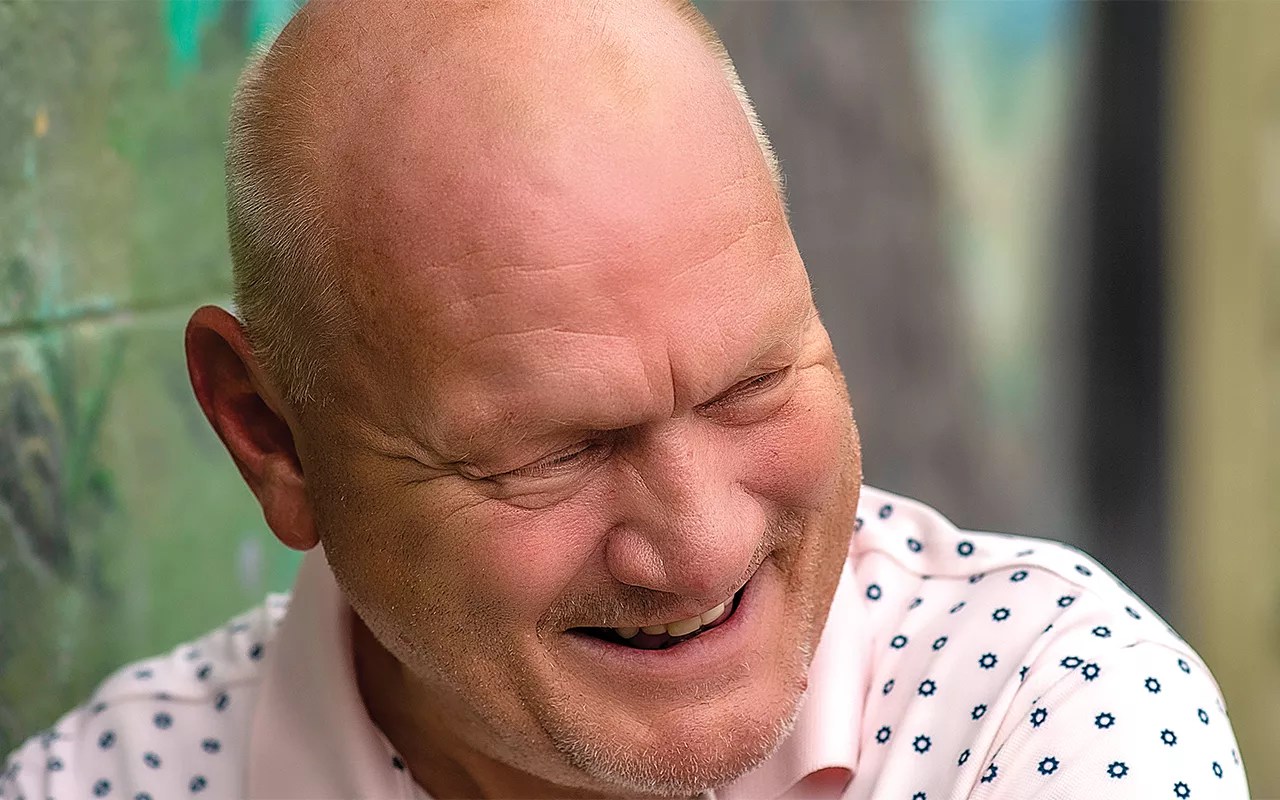
Evan Semón

Audio By Carbonatix
At first glance, there’s nothing special about the man sitting near the entrance of the Holiday Inn off Hampden. He’s a big dude, but neither his posture nor his sartorial presentation – he’s wearing sneakers, shorts, a Colorado Avalanche T-shirt and a cap emblazoned with a stylized cartoon skull – are particularly striking.
Only when he looks up, a crooked smile splitting his doughy face, and utters a gravelly “Hey!” in his instantly identifiable voice does it become clear that this nondescript guy is Michael Floorwax.
His name may not strike a chord with transplants who arrived in Denver over the past five years or so. But to longtimers, Floorwax is a comedy legend – a homegrown version of Howard Stern, but with an edge that was more kind than cruel.
Over the span of nearly a quarter-century, Floorwax and partner Rick Lewis co-hosted Lewis and Floorwax, a morning-drive program on 103.5 The Fox that rocketed them to unprecedented celebrity status in the Mile High City.
“They became the highest-paid entertainers in Denver history,” notes Peter Schaffer, who served as the agent for the pair and continues to handle Floorwax’s business. “I think they still are.”
“Michael and Rick were making large sums of money,” confirms Jay Fox, Floorwax’s accountant and the person he repeatedly identifies as his best friend. “Probably in excess of a million dollars a year with the commercials and all those other things.”
Their ancillary projects included the Groove Hawgs, a blues-rock band in which Lewis handled the drums while Floorwax held the spotlight, as usual, belting out songs in an unexpectedly credible manner. Kenny Passarelli, among the finest musicians to ever hail from Denver (he co-wrote and played on “Rocky Mountain Way,” the Joe Walsh classic that was later adopted by the Colorado Rockies), helped out with the Hawgs back in the day and is currently collaborating on music with Floorwax, whom he sees as the real deal. “He was great on stage,” Passarelli says, “and he has a really fantastic voice.”
But the foundation of Floorwax’s fame was laughter. Rick Goins, also known as G-Man, the sports expert who served as a supporting cast member on Lewis and Floorwax for many years, puts it simply: “Wax was the funniest guy in radio for almost 25 years. And that’s not even debatable, in my opinion.”
Then, almost a decade ago, Floorwax suddenly vanished from his namesake show.
And he never returned.
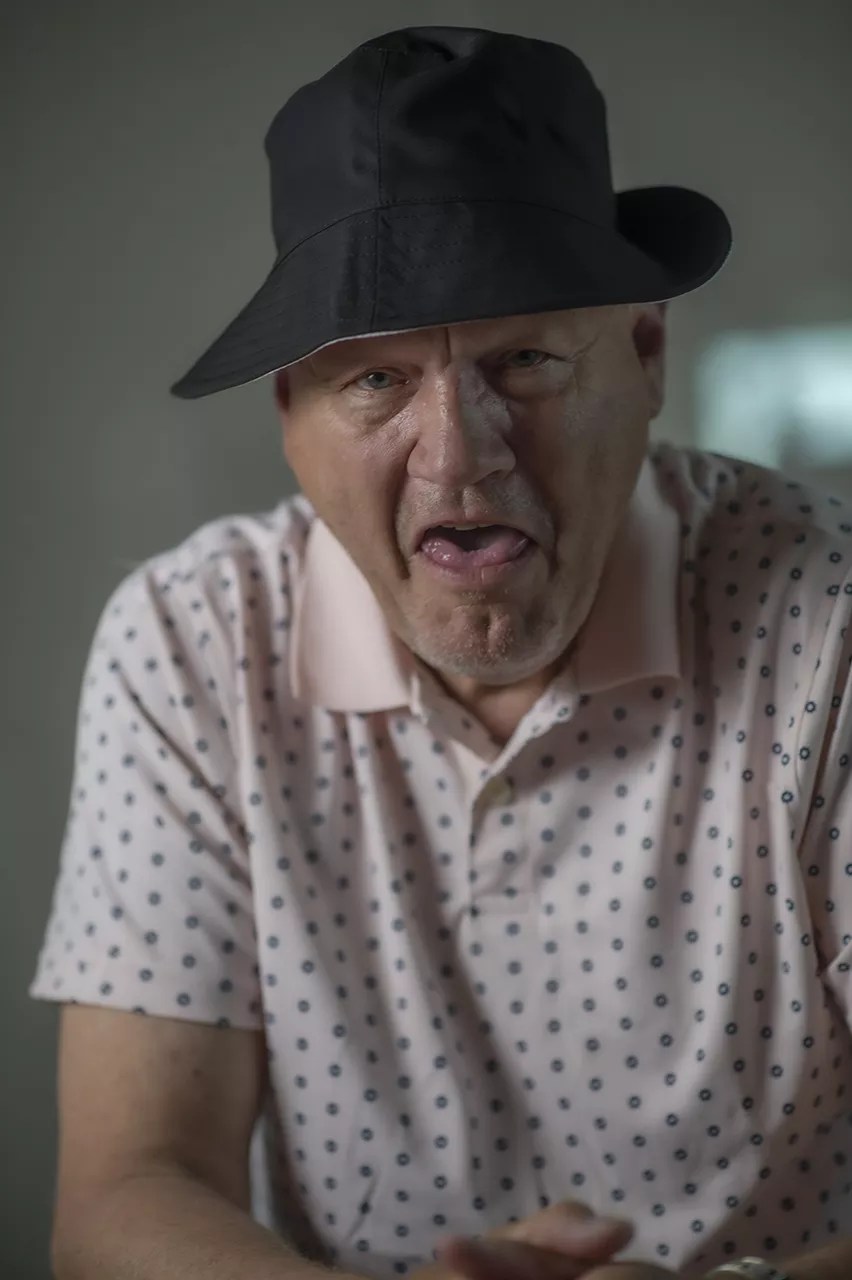
Michael Floorwax is back.
Evan Semón
What happened? The question remains a Google favorite in Denver to this day, in part because Floorwax didn’t talk publicly about the mental health challenges he faced for years – and when he finally spoke to Westword in July 2018 to preview a sit-down with Peter Boyles on KNUS radio, he shied away from specifics. He said only that he’d been battling clinical depression but had experienced some relief thanks to treatment involving ketamine, an anesthetic that was known to recreational users as Special K and became controversial locally owing to its role in the death of Elijah McClain after a horrific interaction with Aurora police officers in August 2019.
Only now, nearly five years later, is Floorwax ready to tell the whole story – or at least as much of it as he can recall; he admits that his memory, which was never first-rate, has declined significantly. Dr. Sara Markey, a psychiatrist and medical director for Progressive Psychiatry, a Denver-based practice that Floorwax credits with saving his life, thinks the deterioration may stem from negative effects related to electroconvulsive therapy, or ECT, one of many failed treatments prior to his becoming her patient. When asked what he thinks of this theory, however, Floorwax maintains that he never underwent ECT.
Fortunately, Floorwax’s sense of humor is intact. It’s always been based on his quick wit – the ability to come up with something riotous on the spur of the moment. “Morning drive is the best place to do improv,” he contends. “Really, that’s all it is: improv. It’s what I do.”
And now he’s doing it again. He’s currently workshopping a podcast in which he teams with G-Man and Steve “Mudflap” McGrew, another veteran of standup comedy who had a highly successful stint on the morning show for country radio giant KYGO from 2001 to 2009; he also manned the early shift on C&W rival The Wolf for a couple of years.
Should a radio executive hear the results and decide to plug the program into an outlet’s lineup, McGrew, for one, would definitely be game. “This is not to toot our own horns,” he says, “but Wax and I together are two monsters of Denver radio. Wax had the number-one rock show and we had the number-one country show. So putting the two funniest people on both shows together is kind of a no-brainer.”
Such a gig would certainly help Floorwax from a financial perspective. According to Fox, the riches earned by his client and pal are pretty much gone. “He never saved a dime of it,” he says. “He spent his income on fancy tables and chairs and lamps and heavy-duty clothing and guns and rifles, and now he has zero income. Zero, zip, nothing, nada for five years.”
Floorwax is currently subsisting on Social Security disability payments. “I had to sell the house that I had in Bear Creek and everything else because of all the medical expenses,” he explains. “You have to start over. That’s just the way it is.”
Still, he’s upbeat about recent developments. He thinks the podcast is coming along well, and after two months at the Holiday Inn, he’s moving into an apartment in Capitol Hill that Fox set up for him. His current state of mind is also improved, a sharp contrast to the agony he suffered for years – pain so vivid and relentless that he had to withstand the temptation to take his own life not just once or twice, but over and over again.
“I finally feel good,” Floorwax stresses. “It took a long time, but I finally feel good.”
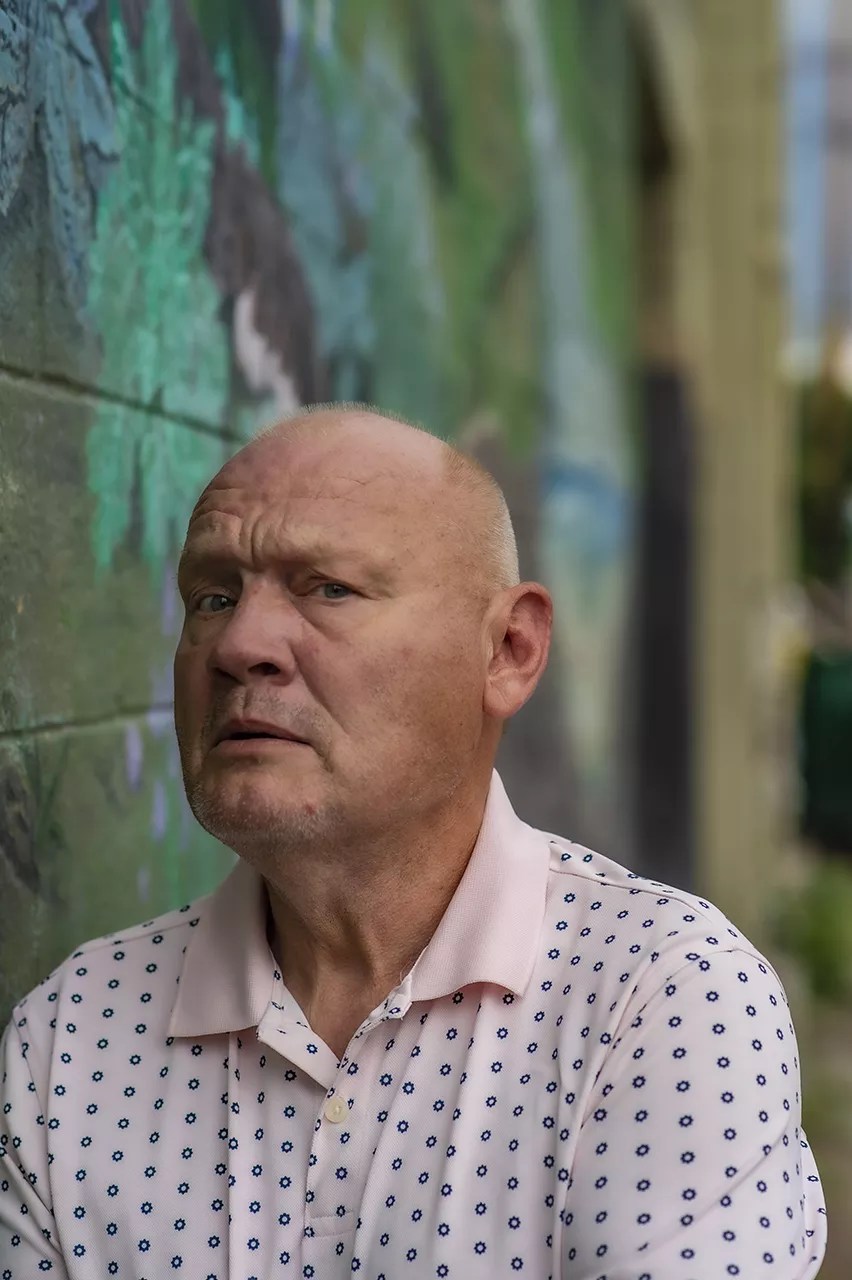
Michael Floorwax left Lewis and Floorwax almost ten years ago.
Evan Semón
When arranging the interview with Westword, Floorwax begged off meeting at the apartment, which he described as “kind of a mess,” in favor of gabbing at an area park. But this idea apparently slipped his mind, and since he doesn’t drive these days, he suggests chatting on the Holiday Inn bench – not exactly the most intimate location given its proximity to a parking lot and the steady stream of tourists going in and out of the hotel. So instead we head to Clement Park, near Columbine High School, and find a picnic table overlooking a lake.
Once settled, Floorwax pulls out a cigar roughly the size of a baby’s arm and asks if it would be okay for him to light up. “These are called Robustos,” he says as the sweet smoke curls around him, providing the perfect atmosphere for reminiscence.
His tale begins 61 years ago, when he was born in “fabulous Fargo, North Dakota” and christened Michael Steinke Jr. His father, Mike Sr., was “a biker,” he notes, and his mother, Harriet Olson, was “a brilliant jazz singer. But she never quit drinking. She was done in her early thirties, just from drinking. Too many vodka tonics. But that helped save me when I was a drunk. I saw what happened to her.” He hasn’t imbibed or done drugs for decades.
By the time his mother passed away, when he was in his early teens, he was living with his dad. “It wasn’t pretty around that house, so one day, the old man just came and got me,” he says.
The family he joined in rural Minnesota, where Mike Sr. had moved, included three step-siblings – Chris, Robert and Carrie – and the change was positive. But in the years that followed, he developed an itch to hit the road, and at eighteen, he teamed up with some buddies and caught “the first car out of town.” He wound up in Denver not because of any grand plan, but because “that’s where they were going.”
Before long, he landed a job in the kitchen at the Wellington Broker, a fine-dining restaurant in Glendale. He was listening to the radio at work one day when he heard about a new talent night at a club overseen by the late George McKelvey, the progenitor of Denver’s comedy scene, “where anybody could go on and do standup,” he says. “I was like, ‘You’ve got to be shitting me.’ It blew me away, and I thought, ‘I’ve got to do that.'”
An aficionado of George Carlin and Cheech & Chong, he knew he was funny. “I was the class clown – plus a clown in general, since I was getting high in those days,” he says. “I’ve done everything there is to do except for needles, because my dad said, ‘You’re not going to do that, understand?’ And he was smart to say that, because I would have done it, for sure.”
He’d never done standup, either, before taking part in the new talent night. “I talked about drugs and I talked about liquor and I talked about women. The big three,” he says. “And afterward, I just had a feeling that this is what I wanted to do.”
For his second swing at new talent night, “I was Michael Floorwax,” he says. “I don’t know why. When they introduced me by my real name the first time, it didn’t seem right. I wanted to have something different, and that was the first thing that came to my mind.”
Did he ever wish he’d given the new moniker more consideration? The question prompts a Floorwax guffaw.
“I’ve had regrets that I didn’t think harder,” he replies, “but not about that.”
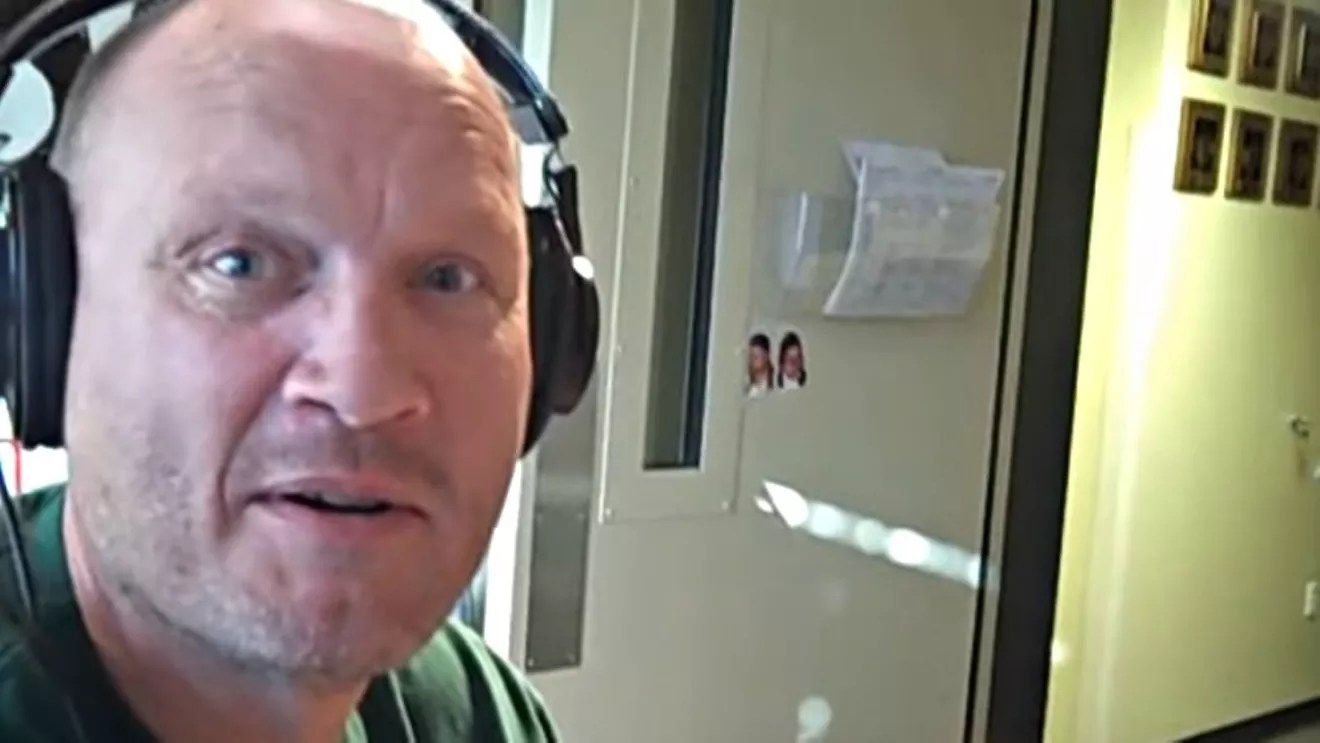
Michael Floorwax circa 2009, at the height of his popularity.
YouTube
The rise of Michael Floorwax was rapid. With McKelvey’s blessing, he quickly graduated from new talent night to scheduled stints at local nightspots to regional tours. At first he was the opening act, but by the time he was in his early twenties, he was headlining – and to promote his appearances, he started guesting on radio shows. “There’d be a morning show in every town, and every time, they’d have a host who ran the show and knew what the fuck he was doing,” he says. “Like in Cincinnati, on this station called WEBN, there was a guy named Eddie Fingers, and when I went in there, we just started going boom, boom, boom! I could tell it was different with this dude. I was cracking off a few beauties and we were crushing it, having a great time.”
Among those impressed was Randy Michaels, the power behind Jacor Communications and a crucial figure in the growth of national radio conglomerates; Jacor eventually merged with Clear Channel, the precursor to iHeartMedia, the largest owner of stations in the United States. Michaels asked Floorwax to meet and quickly launched him into a new career. “He was like, ‘Pick a city, and you can do whatever you want,’ which I thought was pretty cool,” Floorwax recalls. “So I said, ‘I’m staying in Denver. I like it there.'”
At the Fox, a Jacor property, Floorwax was teamed with a few co-hosts, but the one who stuck was Lewis. “I thought they were the perfect radio team,” says Schaffer, who’s now best known as a sports agent; his clients have included Pro Football Hall of Fame members Barry Sanders and Jerome Bettis. “Rick was the consummate radio professional. Great timing, great set-up guy, and he also had a tremendous sense of humor, which was unusual for that role. And Wax, he was the funniest guy in Denver: clever, witty, topical and very generous – overly generous.”
Goins agrees, noting that Floorwax was the type of person who’d give a valet fifty bucks when he would have been happy with five.
Within months of its 1990 debut, Lewis and Floorwax was the hottest show on Denver radio, and its stars’ proclivity for pushing the envelope got them branded “shock jocks,” a term associated with Stern.
“Everybody tried to analogize Ricky and Michael with Howard, but that wasn’t the case,” Schaffer insists. “Denver wasn’t a community that gravitated toward shock jocks. Denver fans wanted to hear what was going on in their city. Very parochial, not a shock type of town. Did they do some outlandish stuff? Yeah, in terms of satirical bits to poke fun at celebrities and local people. But they were just doing what Jimmy Fallon and Jimmy Kimmel do every night now. They were so far ahead of their time.”
Still, their Denver-centric material imposed limitations. “We had a number of opportunities to syndicate, but syndication would have changed the nature and direction of the show, because it would have had to be more nationally topical, and the strength of the show was local,” Schaffer explains. “If the Avs were on a run, they were behind it. If there was a mayoral race, they were talking about it. They were always so local, and that’s why people loved them. If you went national, you would have had to talk about what was happening in Los Angeles, Chicago, New York, and you would have lost the Denver audience – and they never did that. They always stayed true to their Colorado roots.”
If the pond was smaller, Floorwax was undeniably one of the biggest fishes in it. But then his world went to hell.

Rick Lewis is still on the air.
Rick Lewis Twitter
Mental health concerns weren’t entirely foreign to Floorwax. They’d flare up on occasion, then recede. But in early 2014, he experienced what he characterizes as a “combo platter” of clinical depression and clinical anxiety, and he was quickly overwhelmed. “It was less than two weeks, and I couldn’t even…I couldn’t handle myself,” he remembers. “I mean, I was so fucking uncomfortable. There was so much discomfort that you didn’t want to do anything other than hang in there and survive. It wasn’t like you were going crazy. You just physically had so much discomfort that you’d trade the pain for anything.”
The crisis brought not just his career, but his life, to an abrupt halt. “You couldn’t leave the house, you couldn’t go for a walk or whatever – not the way it was in the beginning,” he says. “You just had to sit down somewhere.”
Suddenly, planting himself in front of a microphone and making amusing observations for hours at a time became an impossibility. He didn’t suffer anything as dramatic as an on-the-air breakdown, though. Instead, he says, “one day I just didn’t go in.”
Early on at the Fox, hints about Floorwax’s disappearance were offered in lieu of explanations. Lewis, who’s still the morning host on the station and also handles color commentary for Denver Broncos games on KOA, told listeners he couldn’t address the situation because of HIPAA – a reference to the Health Insurance Portability and Accountability Act of 1996, whose wide-ranging rules include provisions restricting companies from revealing information about an employee’s medical history.
Greg Foster, then the vice president/programming for the Denver branch of iHeartMedia, shared even fewer details in response to an inquiry from Westword at the time. Foster’s email stated simply: “Floorwax is currently taking a personal leave of absence. For privacy reasons, we will not comment further.”
Rumors filled this vacuum, with the most prevalent claiming that Floorwax was back on booze and narcotics. But in a statement Lewis read on the Fox that October, Floorwax refuted this presumption. “I did not fall off the wagon,” he wrote. “I have been clean and sober now for thirty years and very proud of that. I did not quit my job, and iHeartMedia did not fire me.
“As you know, if you have listened to the show at all for the past 24 years, I have struggled with certain medical issues,” he continued. “I’ve openly talked about it on the radio and have made many jokes at my own expense about the issues that have plagued me for many years. I know many of you have reached out to me over the years and have said that you struggle from similar conditions.”
He added: “Some of you may know that with these types of conditions, doctors will experiment with many different drugs to see what will work. Some work for a while, some don’t work at all and others can actually make things worse. This past year has been the biggest battle of my life as I continue to seek relief.”
That goal remained beyond Floorwax’s reach for years. “I did not give up and all of this bullshit,” he insists. “I was fighting, fighting, fighting.” But as he went from doctor to doctor without success, he concedes that his frustration would sometimes get the best of him.
“That’s the part of not being myself totally and being sick that I have regret for,” he says. “I got pretty angry at some people. I admit that. I’m a fast reactor to anything, and it’s the same thing with that feeling inside you – anxiety or whatever. It kind of jumps out sometimes, and I’ve tried to work on that to make sure that I’m still polite.”
Nonetheless, the way Floorwax’s fury over his plight manifested itself frightened many people in his orbit, especially given his fondness for firearms. But the only person who was ever really in danger was Floorwax himself, he says – which is why he finally removed weapons from the equation. “I had people come and take the pistols,” he reveals. “I said, ‘Get them out of here.’ I didn’t think I was going to do anything with them, but you know what? It hits you so hard. Sometimes in the middle of the night, it hits you so fucking hard that you’ve had enough of this shit. You’ve just had enough.”
But he made it through. “You have to be tough to survive what happened to me,” he says. And with a little help from ketamine.
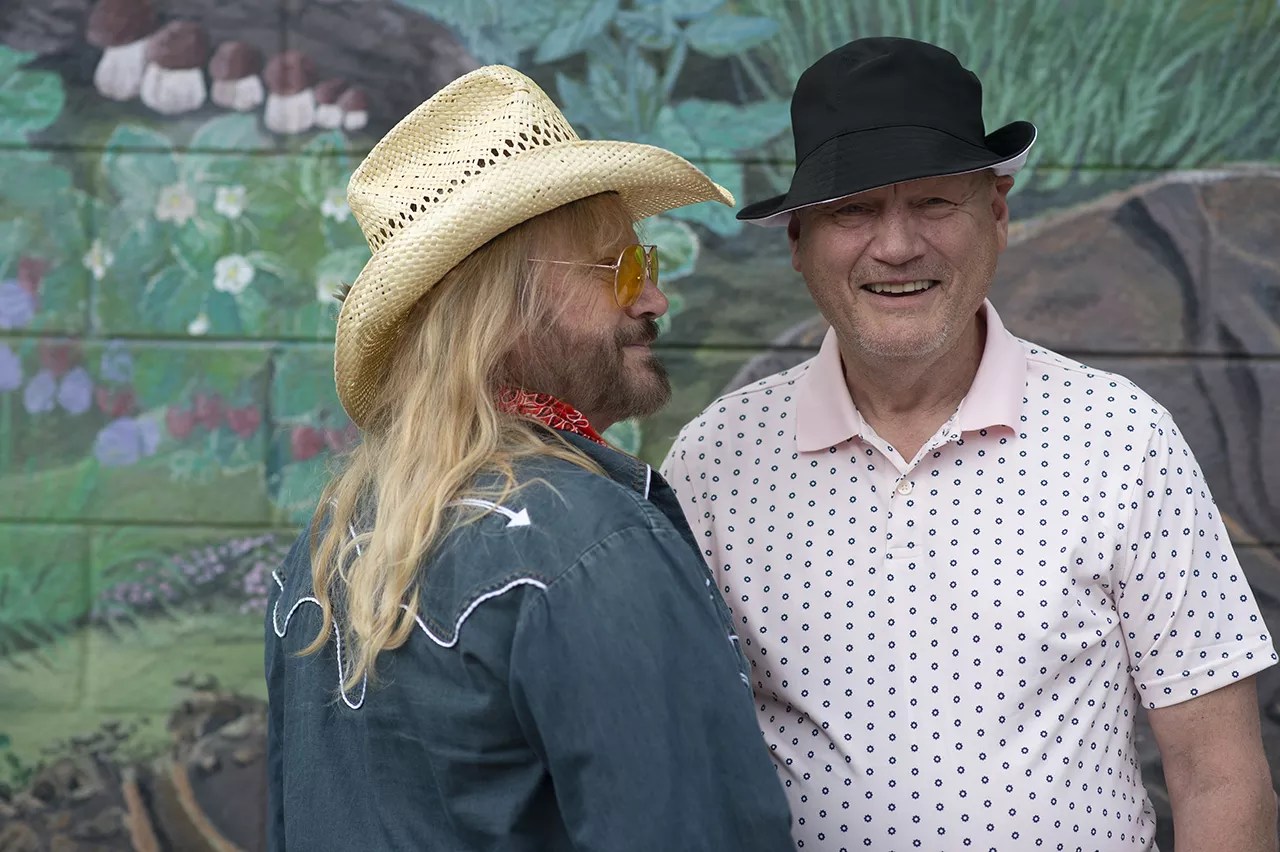
Steve “Mudflap” McGrew and Michael Floorwax are currently workshopping a podcast.
Evan Semón
Beyond verifying that she’s treated Floorwax since 2017, Markey doesn’t divulge any facts about his diagnosis or condition. But she’s happy to share general information on ketamine, which she considers widely misunderstood. “One time, I met with this group of trauma-informed therapists – people of color who do yoga with gang members,” she says. “And I felt like a Karen when I talked with them, because when I said, ‘Ketamine can really help traumatized people,’ all they could think about is Elijah McClain.”
While Markey understands this reaction, she sees an enormous distinction between clinical applications of the substance and what happened to McClain, who was accosted by Aurora cops and administered an extremely high dose of ketamine by paramedics without his knowledge or consent – actions that were subsequently addressed by the court system and the Colorado Legislature. In July 2021, Colorado Governor Jared Polis signed a law banning police officers from telling paramedics or other medical professionals to use ketamine on individuals; that November, McClain’s family settled a wrongful-death lawsuit for $15 million.
In contrast, Markey uses much more modest amounts of ketamine only in carefully controlled circumstances, with patients fully informed about what’s going on and closely monitored to make sure that no problems occur. “The fact that we can give it in an outpatient office setting shows it’s quite safe,” she says. “We’ve never had to call 911 or get out the crash cart. Never.”
Moreover, she adds, ketamine has been indispensable for “treating intractable cases: treatment-resistant depression, treatment-resistant PTSD, OCD and anxiety, and some treatment-resistant pain conditions.”
The term “treatment-resistant” is key. “People don’t just walk in off the street and get ketamine,” Markey emphasizes. Rather, the drug is prescribed when more typical prescription options fall short. “Ketamine can be a godsend for people who have mostly neuropathic pain that other treatments haven’t helped. It works primarily on the NMDA receptor in the brain, which affects glutamate, rather than on serotonins and dopamine, like standard anti-depressants,” she points out.
Some patients are given ketamine in tablet form. But it’s administered to Floorwax intravenously, and when it hits his system, he says, “You get a sweet buzz – which is the irony of it. I haven’t taken drugs for a long, long time, but when they gave me this ketamine, I was like, ‘If this doesn’t work, okay, but I feel good when I’m in here.'” After a session, his depression and anxiety are lessened, and he says the periods of relief have gotten longer over the years – which is why he’s now getting a ketamine infusion every two or three months.
Although Floorwax also takes other medications to address his condition, he doubts he’d still be alive without ketamine, and Markey says he’s far from the only patient to reach such a conclusion. “I want people to know this treatment is available to them, and it really can be life-changing, and life-saving,” she says.
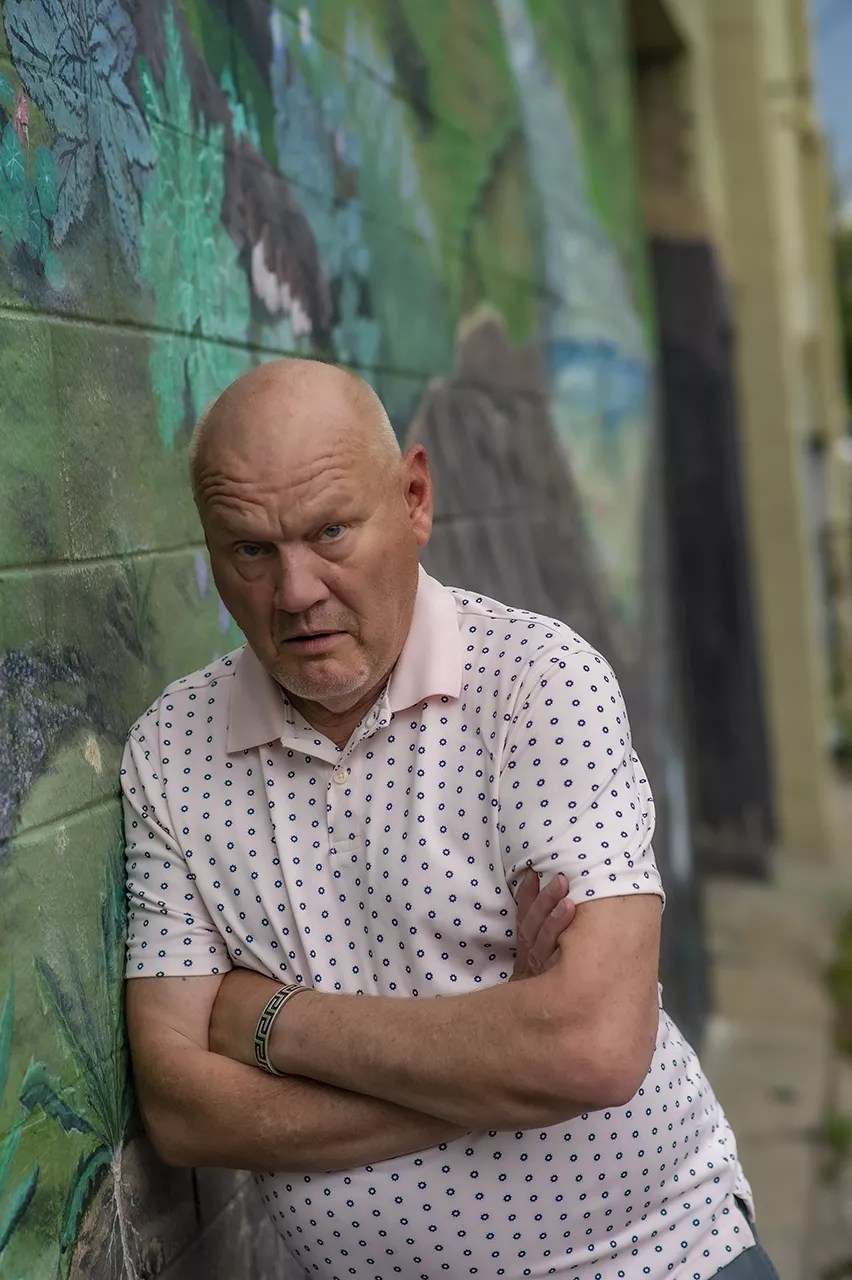
Michael Floorwax is now at home in Capitol Hill.
Evan Semón
Not that ketamine has miraculously returned Floorwax to the Denver radio throne he occupied prior to 2014. “During the dark times, during the lowest lows, I think Wax burned a lot of bridges in the industry – but he didn’t know he was burning those bridges,” says Goins, who’s currently the membership director at Bear Creek Golf Club. “He was frustrated and miffed that people weren’t calling him back, and he probably wrote some things that came across poorly. But I think he’s really grown and gotten better. He’s a different person than he was a year, year and a half ago.”
McGrew concurs: “I have seen a massive, massive improvement to where he is today. And he’s just as funny as he ever was. I always tell him, ‘Wax is back.'”
Goins hopes that when they’re ready for streaming, the podcasts will be the next step in Floorwax’s return to radio; a previous iteration that featured iconic Denver DJ Gregg “Uncle Nasty” Stone in place of McGrew turned out to be a false start. “He just needs some program director to give him a second chance,” Goins says.
Such a break won’t lift Floorwax into his previous tax bracket; with terrestrial radio under assault from Spotify, Pandora and more, salaries these days are a mere fraction of what they were during the glory days. But he should definitely be able to afford a few more Robustos.
Meanwhile, he’s on a creative tear musically. “Music has been his savior,” says Passarelli, who’s showcasing his new production, Forever Is Now, with partner Amy Loper during a July 26 date at Dazzle. “He writes every day. I’ve got a book of his lyrics as big as a phone book.”
With the financial support of Brad Coors, a scion of the famed brewing family, Passarelli helped Floorwax complete an album of spiritual songs dedicated to the heavenly presence he’s dubbed “the Big Cheese.” Among the highlights is “The Rev Says,” a tribute to anti-gang activist Reverend Leon Kelly. Next up for the pair is a country offering.
Fox sees these assorted efforts as beneficial for Floorwax’s ongoing recovery. “For Michael, there’s hope,” he says. “He is very optimistic about his future, and that’s a good thing.”
“I think I can sing with some of the better guys, and I can definitely write music,” Floorwax acknowledges. “I’ve proven that to myself. But I’m here to crack a few off. That’s the way it is. That’s what I’m here for. If you’re with me, it’s eventually going to end up in dick jokes.”
Now he’s ready to leave the Holiday Inn behind and become an official resident of Capitol Hill. “I’ve got a beautiful terrace overlooking the mountains and the old part of the city,” he says. “I can have a cigar and write my stuff, and I’ve been doing that.”
After a pause, he adds, “I feel pretty lucky all of a sudden.”